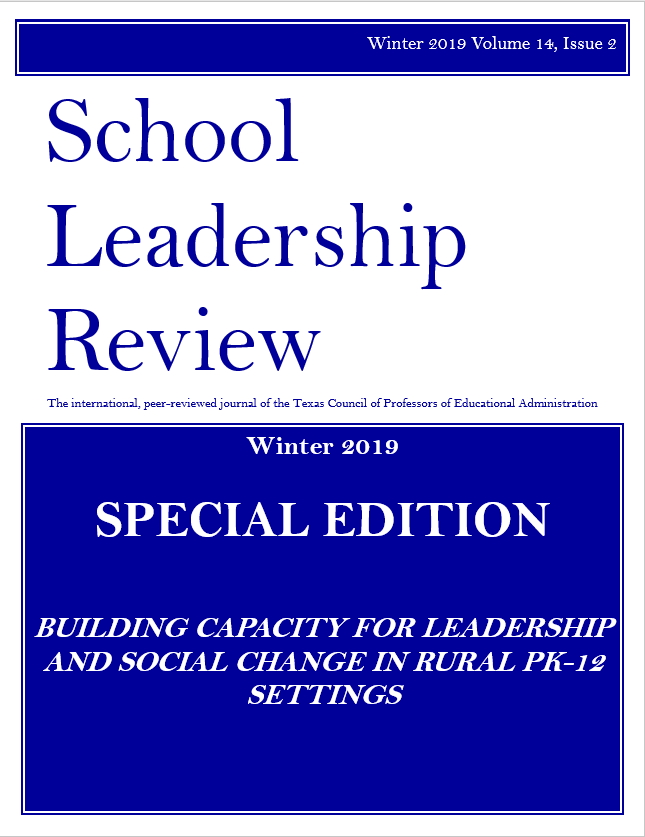Volume 14, Issue 2 (2019) Building Capacity for Leadership and Social Change in Rural PK-12 Settings
Rural schools face many challenges. As Hill (2014) discusses, reduction in funding due to fluctuations in enrollment and a declining tax base, reluctance to meet the needs of second language learners, and the inability to attract and retain new educators are a few such challenges. More importantly, while a vast majority of Texas schools are rural, there is a lack of empirical research guiding leadership in rural schools.
Within the last 10 years, the topic of job-embedded professional development for educators has expanded considerably. The focus of research has shifted from general aspects of professional development to more specific applications related to stakeholder outcomes, other than student achievement. What seems to be lacking is research focused on combining best or emerging practices and/or models of professional development addressing rural PK-12 settings.
Finally, Texas schools are becoming increasingly more diverse. Within the construct of racial and ethnic distributions, minorities are the most underrepresented ethnic groups in the state, despite the fact that Texas does not have a clear ethnic majority. The facts are further exacerbated when examining the overrepresentation of ethnic groups in discipline, special education, and an underrepresentation in gifted and talented and higher-level courses.
Therefore, the purpose of this special edition is to inform practitioners in Texas and beyond as they address improving leadership capacity, building educator capacity and impacting social change inherent to practice in rural PK-12 settings.
Articles
Fostering Inclusive Culture through Partnerships with Nonprofits
Kevin Badgett and John Decman
Principals as Instructional Leaders: An Embedded Descriptive Case Study of One Rural School's Effort to Improve Student Outcomes Through Reading Plus
Joshua W. Tremont and Nathan R. Templeton
Emerging Teacher-Leaders for English Learners: A Professional Development Model in Rural Florida
Raisa Ankeny, Nidza Marichal, and Maria Coady
Stories We Don’t Tell: Research’s Limited Accounting of Rural Schools
Michael Thier and Paul Beach
Professional Learning in Trauma Informed Positive Education: Moving School Communities from Trauma Affected to Trauma Aware
Helen Stokes and Tom Brunzell
Perceptions of Rural Superintendents on Factors Influencing Employment Decisions
Heather P. Williams, Kathleen Shoup, Lisa Colon Durham, Ben A. Johnson, Shannon Dunstan, Brittany A. Brady, and Carl F. Siebert
Designing our Principal Pipeline from a Job-embedded Residency
Dusty L. Palmer, Irma L. Almager, and Fernando Valle
Using Equity Audits to Create a Support System for Marginalized Students
Dusty L. Palmer, Irma L. Almager, Fernando Valle, Cathy Gabro, and Vanessa deLeon
Leveraging University Partnerships to Build Capacity in Rural Schools: A Case Study
Wesley D. Hickey, Ross Sherman, Cody Mize, and Michael Donley

Editors
- Guest Editor
- Nathan R. Templeton, EdD
- Guest Editor
- Jennifer T. Butcher, PhD
- Guest Editor
- J. Kenneth Young, PhD


